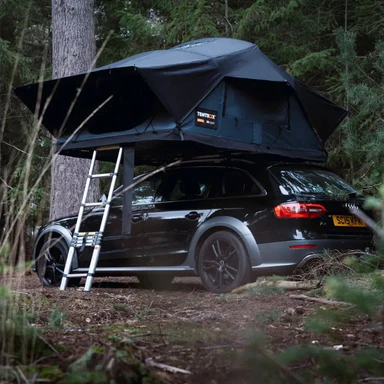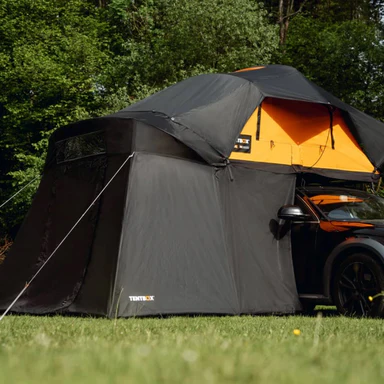
 Save £150.00
Save £150.00
TentBox Lite XL Living Pod Bundle
Weather Protection 4 Season Rated & Wind Rating up to 39mph. Set up in 5 minutes No fiddling about pegging poles or inflating your...
View full details

A Soft-shell roof tent resembles a traditional ground tent and does not have hard exterior material.
Softshell rooftop tents typically have a fold out design which overhangs the side of the vehicle. That means when it is packed away it is folded and more compact. Because of this, it also makes them easier to manoeuvre when you install or pack away your roof top tent for the winter.


Fold-out
Most common with soft-shell roof tents. Just pull off the travel cover, pull out the ladder and unfold the tent at a secure angle until it reaches the floor.
Getting in & out
You open and assemble your roof tent, typically within minutes, and climb into the tent through a large entry window with a ladder. Usually, they come with handy shoe bags for you to store your shoes away before you get into the main body of the tent.




Soft-shell roof top tents typically fold out so that half of the tent hangs over the side of the vehicle with a ladder that allows you to enter the tent. This enables a much greater sleeping space in comparison to hard-shell roof top tents with some being larger than a King sized bed.
Softshell tents tend to weigh between 45-60kg which makes them much more ideal for small vehicles and cars. This is due to the fact that smaller vehicles will have a lower dynamic weight limit (the weight you can carry on your car whilst in motion) than other large cars like SUVs or 4x4s.
Most soft-shell roof top tents have a fold out design which overhangs the side of the vehicle. That means when it is packed away it is folded and more compact. Because of this, it also makes them easier to manoeuvre when you install or pack away your roof top tent for the winter.
Soft-shell roof top tents are much more affordable with prices ranging on average at £1,000 to £1,500. In comparison, hardshell rooftop tents range from £1,500+ with some reaching the £3,000 mark.
Most soft shell roof top tents come equipped with a window through the top rainfly which is awesome for stargazing at night or waking up to see the sky on a stunning summer day.
Most soft shell roof top tents have an annex or awning designed to pair with the tent which gives you more private space when creating your own camping space. An annex is a small tent that usually covers the ladder giving you privacy to change or even have a shower.


Setting up and packing away takes longer and maybe frustrating the first couple of times you do it. After a bit of practice you should be able to assemble most roof tents in under five minutes.
Since most softshell tents have a fold out design they will take up space adjacent to the vehicle which means requiring you to purchase two parking spaces at the campsite you visit.
The majority of soft-shell roof top tents do not allow for your bedding and pillows to be packed away with the tent. This is because most need to be folded and compressed when packed away.




A well designed one can be assembled in 30 seconds compared to Soft-shell rooftop tents that typically take 5 minutes. Simply unbuckle some straps and push the top of the shell and the gas-assisted struts can do the rest of the work for you
Most hard-shell rooftop tents have some space between the in-built mattress and the top shell which allows you to leave some light bedding and thin pillows.
They are typically made from harder plastic to be able to take on the rough and tumble of camping. Some hard-shell roof tents include vehicle grade ABS or aluminium with UV protective agent materials. When you're camping you're bound to scuff your tent or have branches scrape and fall on it.
If you love a sporty or activity based camping trip then a hard-shell rooftop tent is your best bet. Soft-shell rooftop tents as of today do not have the capability to store and carry equipment on top of your rooftop tent.


Hardshell rooftop tents are typically more expensive than soft-shell rooftop tents mainly due to greater design features and the higher quality or more durable materials used to make them.
They are typically heavier than soft-shell rooftop tents which based on the type of vehicle you have and the dynamic weight limit of your car means you can only purchase a soft-shell roof top tent.

£1,250

£1,350

£1,445

£1,595

£1,100
50Kgs
54Kgs
81Kgs Total with Annex
73Kgs
43Kgs
2 Adults + 1 Child
2 Adults + 1 Child
2 Adults + 1 Child
4 Adults
2 Adults
W: 138 x L: 240 cm
W: 140 x L: 240 cm
W: 140 x L: 240 cm
W: 190 x L: 240 cm
W: 129.5 x L: 243.8 cm
6cm high-density foam
6cm high-density foam
6.35cm Bonded Chip foam
6cm high-density foam
6cm high-density PU foam
3 - 5 mins
3 - 5 mins
5 mins
4 - 5 mins
3 - 5 mins
N/a
Thin bedding
N/a
Thin bedding
N/a
Main Hood: 2000mm HH
Outer Hood: 4000mm HH
3000mm HH
Water resistant material + all weather annex
3000mm HH
Water-repellant 260g 600d poly/cotton ripstop
up to 39mph
TBC
TBC
TBC
TBC
5 years (extended)
2 years
2 years
2 years
2 years
30 mins
30 mins
30-45 mins
30-45 mins
30 mins


There's no having to spend all that time pitching up a tent and nail in stakes which come undone.
Great mattress comfort and the fact that you're going to be on flat surface by being your roof makes a world of difference.
The average cost of a hotel stay in the UK is £79 according to hotels-and-discounts.com. So just 7 nights at a hotel somewhere and you've paid out £553.
Roof tents come with great rain & water resistance with a minimum Hydrostatic Rating of 2,000mm so you don't need to worry about leaky tents!
Roof Tents are made out of great quality materials and are much more durable materials than regular tents, especially their hardshell rooftop tents. Made of vehicle grade ABS with UV protective agent materials so that you can camp for years to come.
With your roof tent you don't have to waste time having to drive to your planned destinations and get there faster before all the crowds.
Camping with a Rooftop Tent does require a few things to be set up:
1. You need a set roof bars or roof racks for your 4x4 or car that fit your vehicle
2. These roof bars / racks need a large enough weight limit to take the weight of your chosen rooftop tent
3. Check the dynamic weight limit of your vehicle is greater than the weight of the rooftop tent plus your roof bars.
Then you're all set to go on your adventure
In general, rooftop tents are warmer than traditional tents.
There are a few reasons why they are warmer than traditional tents but we do advise additional cold protection like inner tent insulation for the cold winter months.
What makes them warmer than traditional tents?
1. Elevation - Getting away from the cold ground will increase the warmth in the tent
2. Thicker materials - especially hard-shell rooftop tents are made of more durable and thicker materials which are better at retaining heat.
3. Some rooftop tents are designed for better insulation keeping you cooler in the summer and warmer in the winter days with your body heat.
Consider storing your rooftop tent away in your garage or storage space when you will not use it for long periods.
You can store your rooftop tent on top of your vehicle all year round.
We think you should consider a few things if you want to this:
1. Protect it from the rain by using a extra water resistant PVC cover
2. Factor in the extra fuel usage by carrying the rooftop tent on your vehicle all year round
3. Risk of theft. Add extra security bolts or get your rooftop tent insured for peace of mind
The main weight limit we need to consider is the dynamic weight limit of your vehicle.
You’ll want to take a look at your car’s manual for the weight limit when choosing tents for the top of your car.
Dynamic weight
Dynamic weight is simply the amount of weight you can have on your car while it’s in motion. Basically how the forces affect it from all directions while driving.
Static Weight
Static weight is just the amount of weight your car can carry while standing still; this includes your gear and passengers.
As long as the roof bars plus the rooftop tent in total are less than the dynamic weight limit of your vehicle then you're set!
Yes a rooftop tent will decrease your mileage due to the added weight and drag from the wind.
By how much it is difficult to estimate and depends on two main factors:
1. The weight of the rooftop tent
2. How bulky the rooftop tent is when closed causing wind resistance
To reduce the impact on mileage choose a rooftop tent that is lighter than 65kg and has a slimeline frame when closed.